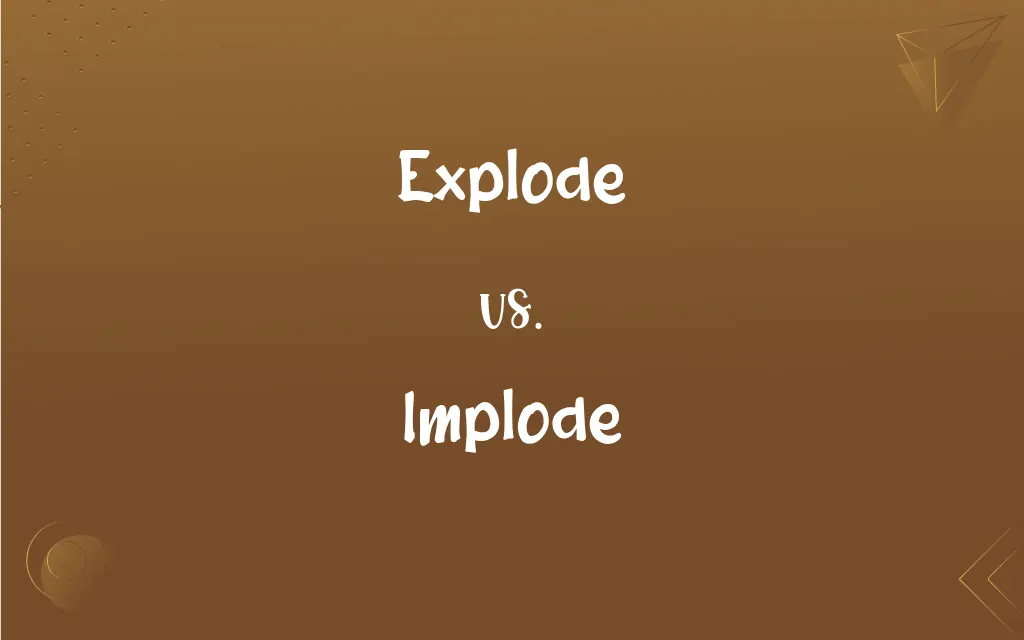Explode vs. Implode: What's the Difference?
Edited by Harlon Moss || By Janet White || Updated on October 2, 2023
Explode involves a release of energy outward, causing a sudden and violent burst, while implode involves collapsing or bursting inward due to external pressure.

Key Differences
Explode and implode represent opposite physical actions concerning the direction of force application and resultant movements. Explode implies a sudden release of energy or force outward, characterized by a rapid expansion or bursting outward of material. This can be due to chemical reactions, mechanical failure, or other causes, resulting in the expulsion of matter and energy outwardly. In contrast, implode denotes the process of something collapsing or bursting inward, typically resulting from external pressure or a vacuum effect, causing material to be drawn inward, rather than expelled outward.
In practical applications, the terms explode and implode are used to describe different types of destructive events. An explosion, caused by the rapid release of energy, can result from chemical reactions, such as a fire or a bomb detonating, and is often associated with destruction, loud noises, and the release of heat and light. On the other hand, implosion is commonly seen in structural failures where external pressure exceeds internal pressure, causing structures like buildings or submarines to collapse inwardly, generating a suction effect rather than an expansive force.
Diving deeper into the concepts, explode is associated with outward dynamics, showcasing a chaotic and expansive effect, with pieces or fragments being thrown outward from the center of the explosion. This outward release of energy has a dispersive impact, affecting a wider area. Conversely, implode carries an inward dynamic, where the structural elements collapse towards the center. This inward movement is characterized by concentration and consolidation of material, affecting a more confined space.
Further distinguishing the two terms, the aftermath of an explosion and an implosion are visually and structurally different. An explosion results in scattered debris, dispersed around the explosion site, reflecting the outward force that has been applied. In contrast, an implosion typically leaves debris concentrated at the collapse site, reflecting the inward pull or collapse that has occurred, leading to a more centralized accumulation of material.
Comparison Chart
Direction
Outward
Inward
ADVERTISEMENT
Cause
Release of energy due to chemical reactions or mechanical failure
External pressure or vacuum effect causing collapse
Effect
Causes dispersion and destruction over a wide area
Leads to concentration and collapse into a confined space
Representation
Represents expansive and outward dynamics
Represents inward and consolidative dynamics
Resultant Debris
Scattered around the explosion site
Concentrated at the collapse site
Explode and Implode Definitions
Explode
Bursting outward due to a rapid release of energy.
The fireworks explode in the sky, illuminating the night.
ADVERTISEMENT
Implode
Collapsing inwardly in a sudden manner.
The building seemed to implode, leaving a pile of rubble.
Explode
To increase suddenly in number or amount.
The population of the town will explode if the new factory is built.
Implode
Bursting inward, usually due to external pressure or vacuum.
The submarine might implode if it goes too deep.
Explode
To expand outward suddenly and usually violently due to the force of internal pressure or the release of chemical or nuclear energy
The bomb exploded.
Implode
Failing suddenly and completely.
The company might implode if the scandal becomes public.
Explode
To burst violently as a result of such expansion.
Implode
Experiencing a sudden collapse or failure.
The team imploded after the loss of their star player.
Explode
To shatter with a loud noise
The vase exploded into tiny pieces when it hit the floor.
Implode
To collapse inward violently.
Explode
To make an emotional outburst
My neighbor exploded in rage at the trespassers.
Implode
To undergo a catastrophic failure
His career imploded after he was caught lying on camera.
Explode
To increase suddenly, sharply, and without control
The population in this area has exploded during the past 12 years.
Implode
To cause to collapse inward violently.
Explode
To change state or appearance suddenly
Over the weekend the trees exploded with color.
Implode
To demolish (a building) by causing to collapse inward.
Explode
(Sports) To hit a golf ball out of a sand trap with a shot that scatters the sand.
Implode
(intransitive) To collapse or burst inward violently.
The submarine imploded as it sank below its crush depth.
Explode
To cause to release energy or burst violently and noisily
The children exploded three firecrackers.
Implode
(transitive) To cause to collapse or burst inward violently.
Explode
To show to be false or unreliable
Explode a hypothesis.
Implode
The opposite of explode, array to string conversion.
Explode
(Sports) To hit (a golf ball) out of a sand trap with an explosive shot.
Implode
To compress (data) with a particular algorithm.
Explode
(transitive) To destroy with an explosion.
The assassin exploded the car by means of a car bomb.
Implode
To burst inward; contrasting with explode.
Explode
(transitive) To destroy violently or abruptly.
They sought to explode the myth.
Implode
Burst inward;
The bottle imploded
Explode
(transitive) To create an exploded view of.
Explode the assembly drawing so that all the fasteners are visible.
Implode
Returning destructively to a prior condition.
The star seemed to implode, turning into a black hole.
Explode
To disprove or debunk.
Explode
(intransitive) To fly apart with sudden violent force; to blow up, to burst, to detonate, to go off.
The bomb explodes.
Explode
To make a violent or emotional outburst.
She exploded when I criticised her hat.
Explode
To increase suddenly.
Explode
To ejaculate.
Explode
To break (a delimited string of text) into several smaller strings by removing the separators.
Explode
To decompress (data) that was previously imploded.
Explode
(transitive) To open all doors and hatches on an automobile.
Explode
Of a die, to produce the highest face result and consequently reroll.
Explode
To become suddenly expanded into a great volume of gas or vapor; to burst violently into flame; as, gunpowder explodes.
Explode
To burst with force and a loud report; to detonate, as a shell filled with powder or the like material, or as a boiler from too great pressure of steam.
Explode
To burst forth with sudden violence and noise; as, at this, his wrath exploded.
Explode
To drive from the stage by noisy expressions of disapprobation; to hoot off; to drive away or reject noisily; as, to explode a play.
Him old and youngExploded, and seized with violent hands.
Explode
To bring into disrepute, and reject; to drive from notice and acceptance; as, to explode a scheme, fashion, or doctrine.
Old exploded contrivances of mercantile fraud.
To explode and exterminate dark atheism.
Explode
To cause to explode or burst noisily; to detonate; as, to explode powder by touching it with fire.
Explode
To drive out with violence and noise, as by powder.
But late the kindled powder did explodeThe massy ball and the brass tube unload.
Explode
Cause to explode;
We exploded the nuclear bomb
Explode
Burst outward, usually with noise;
The champagne bottle exploded
Explode
Show a violent emotional reaction;
The boss exploded when he heard of the resignation of the secretary
Explode
Be unleashed; burst forth with violence or noise;
His anger exploded
Explode
Destroy by exploding;
The enemy exploded the bridge
Explode
Cause to burst as a result of air pressure; of stop consonants like /p/, /t/, and /k/
Explode
Drive from the stage by noisy disapproval
Explode
Show (a theory or claim) to be baseless, or refute and make obsolete
Explode
Increase rapidly and in an uncontrolled manner;
The population of India is exploding
The island's rodent population irrupted
Explode
A sudden, violent expansion with noise and destruction.
The gas leak caused the building to explode.
Explode
Expressing sudden, vehement feeling.
The coach will explode when he sees the messy locker room.
Explode
Refuting something by argument or action.
The scientist was able to explode the myth using data.
FAQs
Can implode refer to a company’s sudden failure?
Yes, implode can metaphorically describe sudden, complete failures.
Is explode always associated with destruction?
Typically, but it can also describe sudden increases or expressions.
Does an explosion disperse materials?
Yes, explosions typically disperse materials outwardly.
Are explode and implode opposites in terms of direction?
Yes, explode is outward, and implode is inward.
Can explode refer to a sudden increase in numbers?
Yes, it can describe a rapid and sudden increase in number or amount.
Can an explosion occur due to a chemical reaction?
Yes, many explosions result from rapid chemical reactions.
Can implosion occur in stars?
Yes, some stars implode and can form black holes.
Is implosion usually due to external pressure?
Yes, implosion is often caused by greater external pressure.
Does implosion consolidate materials?
Yes, implosion results in the inward consolidation of materials.
Can implode describe a sudden emotional breakdown?
Metaphorically, it can describe a sudden inward collapse or failure.
Is the sound produced by explosion and implosion different?
Generally, explosions create loud, concussive sounds; implosions may produce less noise due to inward movement.
About Author
Written by
Janet WhiteJanet White has been an esteemed writer and blogger for Difference Wiki. Holding a Master's degree in Science and Medical Journalism from the prestigious Boston University, she has consistently demonstrated her expertise and passion for her field. When she's not immersed in her work, Janet relishes her time exercising, delving into a good book, and cherishing moments with friends and family.
Edited by
Harlon MossHarlon is a seasoned quality moderator and accomplished content writer for Difference Wiki. An alumnus of the prestigious University of California, he earned his degree in Computer Science. Leveraging his academic background, Harlon brings a meticulous and informed perspective to his work, ensuring content accuracy and excellence.































































